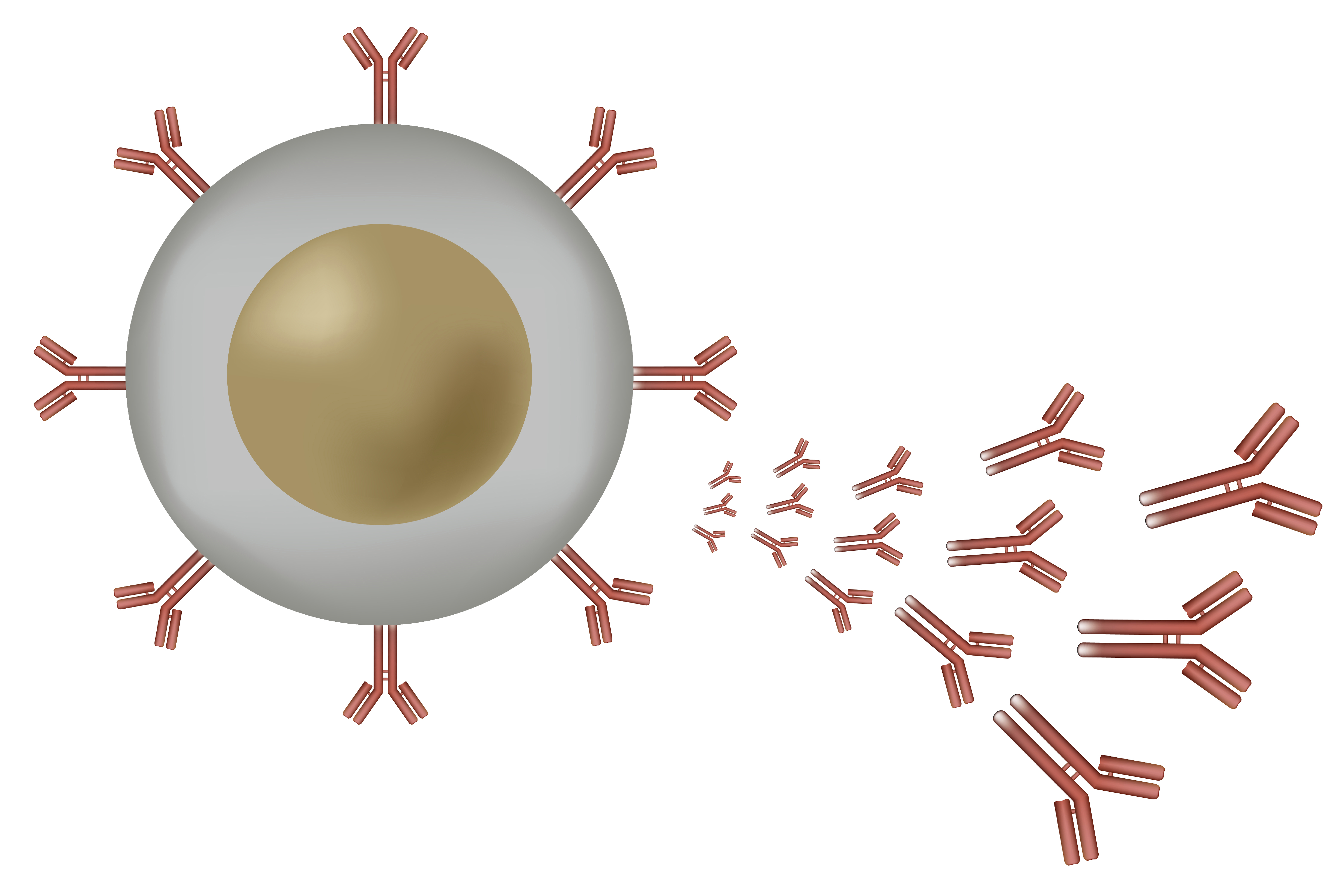b cells produce antibodies
B cells are similar to T cells in that they undergo somatic hypermutation to produce their antigen receptors, However, B cells also undergo a process called isotype switching which allows different functional classes of antibodies i,e,, IgM and IgG to be produced that all have the same antigen specificity, Isotype determines the effector function of the antibody, Antibodies are originally of the IgM isotype, When activated B cells are …
· Here Cox and Brokstad briefly discuss T cell- and B cell-mediated immunity to SARS-CoV-2 stressing that a lack of serum antibodies does not necessarily equate with a lack of immunity to the virus
· The B lymphocyte B cell is one of the most important cells of the body, These cells form part of the adaptive immune response by producing antibodies and presenting antigens to T cells, Once activated, they can mature into plasma cells or memory B lymphocytes, This …
Coronavirus: B cells and T cells explained
b cells produce antibodies
What’s the Difference between B-Cells and T-Cells?

B cells produce antibody molecules; however, these antibodies are not secreted, Rather, they are inserted into the plasma membrane where they serve as a part of B-cell receptors , [2] When a naïve or memory B cell is activated by an antigen, it proliferates and differentiates into an antibody-secreting effector cell, known as a plasmablast or plasma cell, [2]
· The cytokines prime the maturation of B cells, which become plasma cells and produce antibodies to neutralise the pathogen, CD8+ cytotoxic T cells, on the other hand, directly kill infected cells,
•Antibodies are produced only by B lymphocytes, •Humoral immune responses are initiated by binding of antigen to membrane bound antibody on B cells, •Activated B cells secrete soluble antibodies of the same specificity as the membrane receptors, •Antibody responses …
B Cells
B Cells and Antibodies
· May 13 2021 — B cells are the immune cells responsible for creating antibodies and most produce antibodies in response to a pathogen or a vaccine A small subset of B cells instead
· Effector B cells which produce the antibodies clear away with the resolution of infection, and the rest persist as the memory cells that can survive for years, or even a lifetime, The antibody molecules present on a clone a group of genetically identical cells of B cells have a unique paratope, Some of the resulting paratopes and the cells elaborating them have a better affinity for the antigen and are more likely to …
· For example, B-cells sometimes inhibit tumor development by producing antibodies that may attack cancer cells or oncogenic viruses, such as human papillomavirus HPV, which is responsible for most cervical, anal, penile and other reproductive cancers, Other times, regulatory B-cells may release immune-suppressive cytokines that stifle an anti-tumor response, Also, B-cells are far more likely than T-cells to …
B cells produce pathogenic antibodies and impair recovery
· B cells play a central role in the immunopathogenesis of glomerulonephritides and transplant rejection, B cells secrete antibodies that contribute to tissue injury via multiple mechanisms, In addition, B cells contribute to disease pathogenesis in autoimmunity and alloimmunity by presenting antigens as well as providing costimulation and cytokines to T cells, B cells also play an immunomodulatory role in regulating …
Cited by : 303
· Antibodies produced after SCI caused pathology in part by activating intraspinal complement and cells bearing Fc receptors These data indicate that B cells through the production of antibodies affect pathology in SCI One or more components of this pathologic immune response could be considered as novel therapeutic targets for minimizing tissue injury and/or promoting repair after SCI
Not just antibodies: B cells and T cells mediate immunity
B Cells, Antibodies, and More
Generation of B-cell / antibody diversity
11,7E: Making Memory B Cells
B cell
B Cell Activation and Effector Functions
Each B cell produces a single species of antibody, each with a unique antigen-binding site, When a naïve or memory B cell is activated by antigen with the aid of a helper T cell, it proliferates and differentiates into an antibody-secreting effector cell,
Cited by : 11
One of the major roles that B cells play in an immune response is the production of antibodies, that specifically recognise and bind to proteins on the invading bacteria or virus particles, The binding of specific antibody to its target can prevent viruses from entering cells or aid phagocytes in identifying and destroying the bacteria or …
How B cells may generate antibodies after vaccination
B Cells and Antibodies
· Fichier PDF